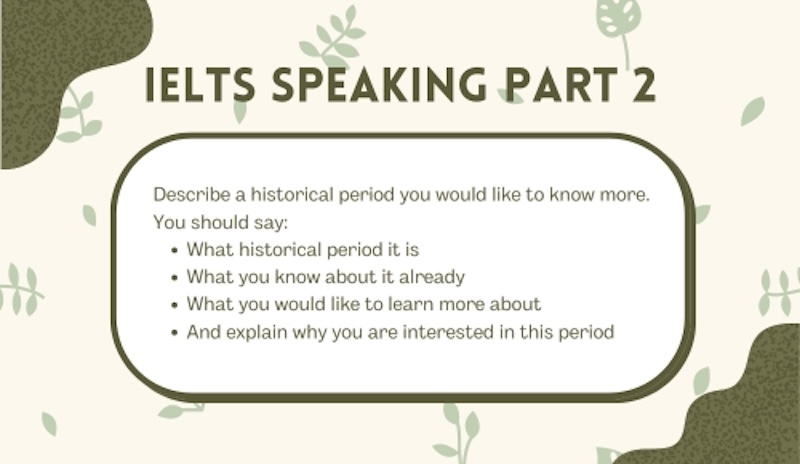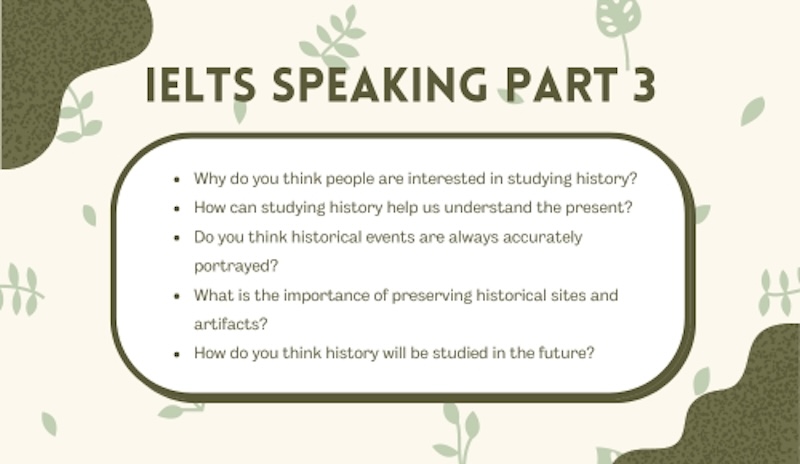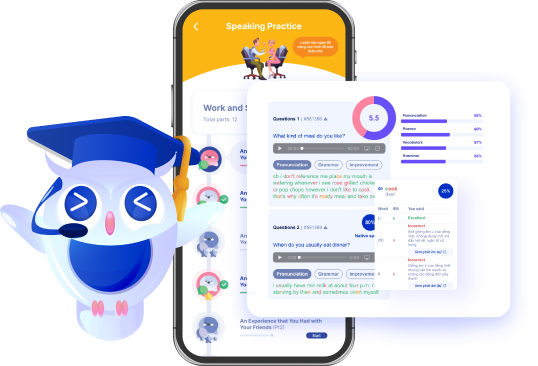Describe a historical period you would like to know more – chủ đề xuất hiện thường xuyên trong bộ đề IELTS Speaking. Hãy cùng Edmicro chuẩn bị kỹ lưỡng cho kỳ thi thực tế sắp tới nhé!
Describe a historical period you would like to know more – Bộ đề IELTS Speaking Part 2
Đề bài: Describe a historical period that you want to know more.

Sample Answer:
I’ve always been fascinated by the Victorian era. It was a period of great social and technological change in Britain, spanning from the mid-19th century to the early 20th century.
I’ve known a few novels set in this time, and some period dramas on TV. From what I understand, it was a time of rapid industrialization, with new inventions and factories springing up everywhere.
I find this period so intriguing because it was a time of great contradictions. On the one hand, there was a lot of progress and innovation, but on the other, there were still many social problems and inequalities. I’m curious to learn more about how people lived, what they believed, and how they navigated these complex times.
(Tôi luôn bị thu hút bởi thời kỳ Victoria. Đó là một giai đoạn thay đổi xã hội và công nghệ lớn ở Anh, kéo dài từ giữa thế kỷ 19 đến đầu thế kỷ 20.
Tôi đã đọc một vài cuốn tiểu thuyết lấy bối cảnh thời này, và tôi đã xem một số bộ phim truyền hình cổ trang. Từ những gì tôi hiểu, đó là thời kỳ công nghiệp hóa nhanh chóng, với những phát minh mới và các nhà máy mọc lên khắp nơi.
Tôi thấy thời kỳ này rất hấp dẫn bởi vì đó là một thời kỳ của những mâu thuẫn lớn. Một mặt, có rất nhiều tiến bộ và đổi mới, nhưng mặt khác, vẫn còn nhiều vấn đề xã hội và bất bình đẳng. Tôi tò mò muốn tìm hiểu thêm về cách mọi người sống, họ tin vào điều gì và cách họ vượt qua những thời kỳ phức tạp này.)
Key Vocabulary:
- industrialization: công nghiệp hóa
- stark contrast: sự tương phản rõ rệt
- intriguing: hấp dẫn, lôi cuốn
- contradictions: mâu thuẫn
- inequalities: bất bình đẳng
Xem thêm: Describe An Intelligent Person You Know – Hướng Dẫn Trả Lời Part 1, 2, 3
Describe a historical period you would like to know more – IELTS Speaking Part 3
Dưới đây là những câu hỏi thường gặp nhất về chủ đề historical period – IELTS Speaking Part 3 mà người học có thể sẽ được hỏi trong kỳ thi chính thức của mình.

Describe a historical period you would like to know more – Why do you think people are interested in studying history?
Sample Answer:
People are interested in studying history for various reasons, including curiosity, a desire to understand the past, and a sense of connection to previous generations. History can provide insights into human nature, societal development, and the causes and consequences of significant events. It can also help us to appreciate the diversity of human experiences and learn from the mistakes of the past.
(Mọi người quan tâm đến việc nghiên cứu lịch sử vì nhiều lý do, bao gồm sự tò mò, mong muốn hiểu về quá khứ và cảm giác kết nối với các thế hệ trước. Lịch sử có thể cung cấp những hiểu biết về bản chất con người, sự phát triển xã hội và nguyên nhân cũng như hậu quả của các sự kiện quan trọng. Nó cũng có thể giúp chúng ta đánh giá sự đa dạng của trải nghiệm con người và học hỏi từ những sai lầm của quá khứ.)
Key Vocabulary:
- curiosity: sự tò mò
- desire to understand the past: mong muốn hiểu về quá khứ
- sense of connection to previous generations: cảm giác kết nối với các thế hệ trước
- insights into human nature: những hiểu biết về bản chất con người
- societal development: sự phát triển xã hội
- appreciate the diversity of human experiences: đánh giá sự đa dạng của trải nghiệm con người
Describe a historical period you would like to know more – How can studying history help us understand the present?
Sample Answer:
Studying history can help us understand the present by providing context and perspective. By examining past events, trends, and decisions, we can gain a better understanding of how they have shaped the world we live in today. This can help us to identify patterns, anticipate future challenges, and make informed decisions about the future.
(Nghiên cứu lịch sử có thể giúp chúng ta hiểu được hiện tại bằng cách cung cấp bối cảnh và quan điểm. Bằng cách nghiên cứu các sự kiện, xu hướng và quyết định trong quá khứ, chúng ta có thể hiểu rõ hơn về cách chúng đã định hình thế giới chúng ta đang sống ngày nay. Điều này có thể giúp chúng ta xác định các mô hình, dự đoán các thách thức trong tương lai và đưa ra quyết định sáng suốt về tương lai.)
Key Vocabulary:
- shaped the world we live in today: định hình thế giới chúng ta đang sống ngày nay
- identify patterns: xác định các mô hình
- anticipate future challenges: dự đoán các thách thức trong tương lai
Do you think historical events are always accurately portrayed?
Sample Answer:
Historical events are not always accurately portrayed due to various factors, including bias, selective memory, and the limitations of historical sources. Historians may interpret events differently based on their own perspectives and the evidence available to them. Additionally, the way historical events are presented in popular culture, such as movies or books, may be influenced by artistic interpretation.
(Các sự kiện lịch sử không phải lúc nào cũng được miêu tả chính xác do nhiều yếu tố, bao gồm định kiến, trí nhớ chọn lọc và hạn chế của các nguồn lịch sử. Các nhà sử học có thể giải thích các sự kiện khác nhau dựa trên quan điểm của riêng họ và bằng chứng có sẵn cho họ. Ngoài ra, cách trình bày các sự kiện lịch sử trong văn hóa đại chúng, chẳng hạn như phim ảnh hoặc sách, có thể bị ảnh hưởng bởi diễn giải nghệ thuật.)
Key Vocabulary:
- accurately: chính xác
- portrayed: được miêu tả
- bias: định kiến
- limitations of historical sources: hạn chế của các nguồn lịch sử
- historians: nhà sử học
- artistic interpretation: diễn giải nghệ thuật
What is the importance of preserving historical sites and artifacts?
Sample Answer:
Preserving historical sites and artifacts is important for several reasons. It helps to connect us to the past, providing tangible evidence of our history and heritage. These sites and artifacts can also offer insights into the lives, cultures, and beliefs of past generations. By preserving them, we can learn from the past, understand our present, and pass on our cultural heritage to future generations.
(Bảo tồn các di tích và hiện vật lịch sử rất quan trọng vì nhiều lý do. Nó giúp chúng ta kết nối với quá khứ, cung cấp bằng chứng hữu hình về lịch sử và di sản của chúng ta. Những địa điểm và hiện vật này cũng có thể cung cấp những hiểu biết về cuộc sống, văn hóa và niềm tin của các thế hệ trước. Bằng cách bảo tồn chúng, chúng ta có thể học hỏi từ quá khứ, hiểu được hiện tại và truyền lại di sản văn hóa của chúng ta cho các thế hệ tương lai.)
Key Vocabulary:
- artifacts: hiện vật
- tangible evidence: bằng chứng hữu hình
- heritage: di sản
- insights into the lives: những hiểu biết về cuộc sống
- pass on our cultural heritage: truyền lại di sản văn hóa
How do you think history will be studied in the future?
Sample Answer:
History is likely to be studied in increasingly innovative and interactive ways in the future. Advances in technology, such as virtual reality and augmented reality, may allow for more immersive and engaging historical experiences. Additionally, the growing availability of digital archives and online resources may make it easier for people to access and study historical information. However, it is important to ensure that these technological advancements do not compromise the accuracy and reliability of historical research.
(Lịch sử có thể được nghiên cứu theo những cách ngày càng sáng tạo và tương tác hơn trong tương lai. Những tiến bộ trong công nghệ, chẳng hạn như thực tế ảo và thực tế tăng cường, có thể cho phép có được những trải nghiệm lịch sử hấp dẫn hơn và nhập vai hơn. Ngoài ra, sự sẵn có ngày càng tăng của các kho lưu trữ kỹ thuật số và tài nguyên trực tuyến có thể giúp mọi người dễ dàng truy cập và nghiên cứu thông tin lịch sử hơn. Tuy nhiên, điều quan trọng là đảm bảo rằng những tiến bộ công nghệ này không làm giảm độ chính xác và độ tin cậy của nghiên cứu lịch sử.)
Key Vocabulary:
- virtual reality: thực tế ảo
- augmented reality: thực tế tăng cường
- immersive experiences: trải nghiệm hấp dẫn
- digital archives: kho lưu trữ kỹ thuật số
Bài viết trên đã cung cấp cho người học bộ câu hỏi kèm gợi ý trả lời chi tiết chủ đề describe a historical period you would like to know more. Nếu còn bất kỳ thắc mắc nào, hãy nhắn tin ngay với Edmicro nhé!
Xem thêm:











